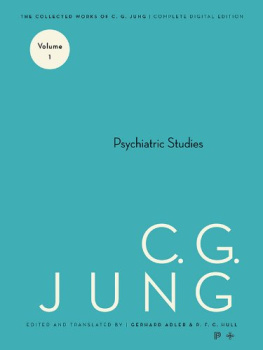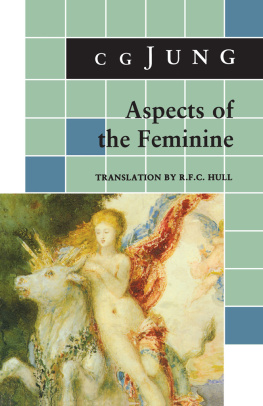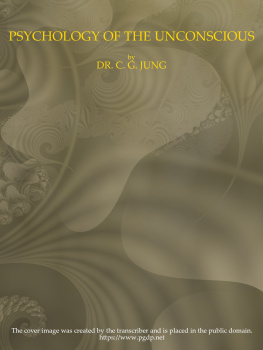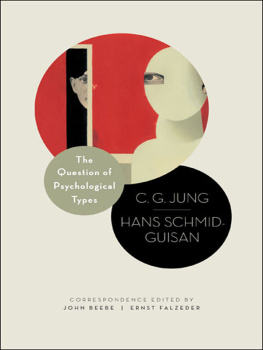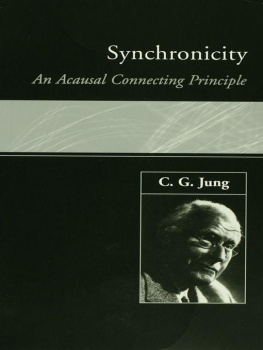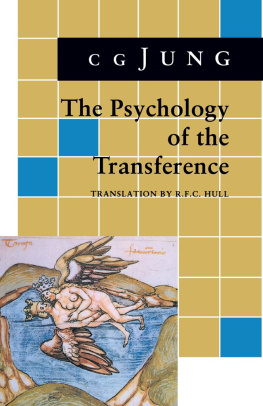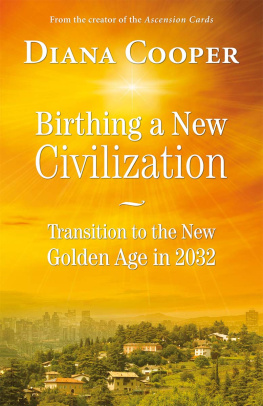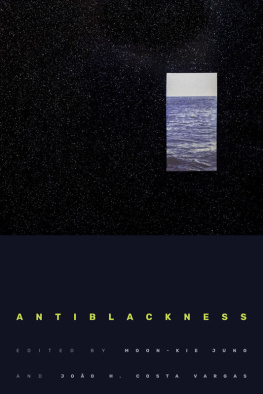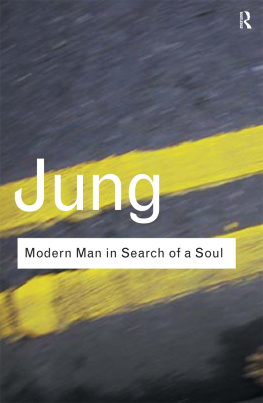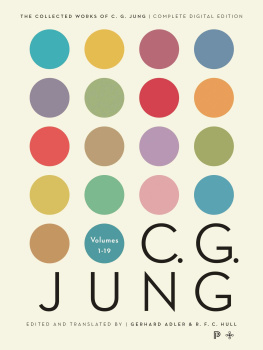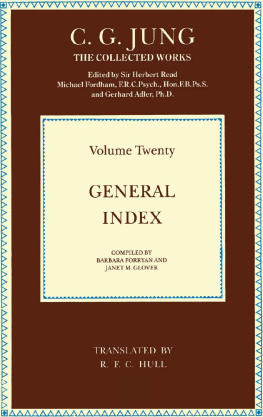C. G. Jung - Civilization in Transition
Here you can read online C. G. Jung - Civilization in Transition full text of the book (entire story) in english for free. Download pdf and epub, get meaning, cover and reviews about this ebook. year: 1964, publisher: Princeton University Press, genre: Science. Description of the work, (preface) as well as reviews are available. Best literature library LitArk.com created for fans of good reading and offers a wide selection of genres:
Romance novel
Science fiction
Adventure
Detective
Science
History
Home and family
Prose
Art
Politics
Computer
Non-fiction
Religion
Business
Children
Humor
Choose a favorite category and find really read worthwhile books. Enjoy immersion in the world of imagination, feel the emotions of the characters or learn something new for yourself, make an fascinating discovery.

- Book:Civilization in Transition
- Author:
- Publisher:Princeton University Press
- Genre:
- Year:1964
- Rating:5 / 5
- Favourites:Add to favourites
- Your mark:
- 100
- 1
- 2
- 3
- 4
- 5
Civilization in Transition: summary, description and annotation
We offer to read an annotation, description, summary or preface (depends on what the author of the book "Civilization in Transition" wrote himself). If you haven't found the necessary information about the book — write in the comments, we will try to find it.
Civilization in Transition — read online for free the complete book (whole text) full work
Below is the text of the book, divided by pages. System saving the place of the last page read, allows you to conveniently read the book "Civilization in Transition" online for free, without having to search again every time where you left off. Put a bookmark, and you can go to the page where you finished reading at any time.
Font size:
Interval:
Bookmark:
B O L L I N G E N S E R I E S X X

THE COLLECTED WORKS
OF
C. G. JUNG
VOLUME 10
EDITORS
SIR HERBERT READ
MICHAEL FORDHAM, M.D., M.R.C.P.
GERHARD ADLER, PH.D.
C. G. JUNG

TRANSLATED BY R. F. C. HULL
B O L L I N G E N S E R I E S X X


COPYRIGHT 1964 BY BOLLINGEN FOUNDATION
SECOND EDITION COPYRIGHT 1970 BY PRINCETON UNIVERSITY PRESS
ALL RIGHTS RESERVED
THIS EDITION IS BEING PUBLISHED IN THE UNITED STATES OF AMERICA BY PRINCETON UNIVERSITY PRESS AND IN ENGLAND BY ROUTLEDGE AND KEGAN PAUL, LTD. IN THE AMERICAN EDITION, ALL THE VOLUMES COMPRISING THE COLLECTED WORKS CONSTITUTE NUMBER XX IN BOLLINGEN SERIES, SPONSORED BY BOLLINGEN FOUNDATION. THE PRESENT VOLUME IS NUMBER 10 OF THE COLLECTED WORKS, AND IS THE THIRTEENTH TO APPEAR.
The Undiscovered Self copyright 1957, 1958, by C. G. Jung. Flying Saucers copyright 1959 by C. G. Jung. The Dreamlike World of India and What India Can Teach Us copyright 1938 and 1939 respectively by Editorial Publications, Inc.
LIBRARY OF CONGRESS CATALOG CARD NUMBER: 75156
MANUFACTURED IN THE UNITED STATES OF AMERICA
In 1918 Jung published a paper, The Role of the Unconscious, which sounds the keynote of the present volume. There he put forward the arresting theory that the conflict in Europe, then almost exclusively interpreted in materialistic terms, was basically a psychological crisis originating in the collective unconscious of the individuals that form groups and nations. Subsequently he wrote a considerable number of essays bearing on the contemporary scene and, in particular, on the relation of the individual to society.
The first two sections of this volume, written during the years between the World Wars, develop the themes broached in the opening essay, and are largely concerned with modern mans discovery of his unconscious premises and the importance of self-knowledge in enabling the individual to maintain himself against social pressures. Specific questions, such as the influence of social changes on the relations between the sexes and of ethnic factors on the development of psychological theories, are also discussed. The third section presents four papers previously published in Essays on Contemporary Events (1947). In these Jung shows that the dreams and fantasies of individual patients, no less than social and political upheavals, which he explains as psychic epidemics, can reflect tendencies in the unconscious life of nations. In an essay first published in 1936 Wotan is presented as an archetypal figure symbolizing the unconscious agencies active in Germany which found expression in the Nazi movement.
The psychodynamics which Jung inferred from the behaviour of individuals and groups, though easier to perceive in Germany, had, however, a much wider application, as he made clear in two major essays written in his last years. In The Undiscovered Self (1957) he reverts to the relation between the individual and a mass society, and in Flying Saucers (1958) he examines the birth of a myth which he regards as compensating the scientistic trends of our technological era. Since the crisis in civilization is maintained by Jung to be moral, his late views on good and evil and on the psychological function of conscience, in section six, are necessary and relevant amplifications of his theme.
The reviews and short articles in section seven present Jungs lively and emotional responses to the pronouncements of his contemporary, Count Hermann Keyserling, on national problems, and to his own visits to the United States and India. Finally, the appendix brings together the documents relating to the years when Jung was president of the International General Medical Society for Psychotherapy and editor of its organ, the Zentralblatt fr Psychotherapie. His energetic nature and feelings of obligation both to society and to his colleagues compelled him to accept this position as a vantage point from which to combat, to the best of his ability, the threat to psychotherapy in Germany under the Nazis. Unjustly, he was subjected to a barrage of tendentious and largely uninformed criticism because of his action. The aims he consistently sought to achieve are now set forth fully for the first time, with the necessary documentation.
*
Grateful acknowledgment is made to the American-Scandinavian Foundation, New York, for permission to quote from the Bellows translation of The Poetic Edda; to the Viking Press, New York, for permission to quote from The Portable Nietzsche, translated by Walter Kaufmann and copyright 1954 by the Viking Press, Inc.; and to Otto Mller Verlag, Salzburg, for permission to reproduce an illustration from Maria Bckeler, Hildegard von Bingen: Wissen die Wege. For advice and assistance, the Editors are grateful to C. A. Meier, M.D., of Zurich; Walter Cimbal, M.D., of Hamburg; W. Morgenthaler, M.D., of Bern; Miss Liselotte Bendix, librarian of the New York Psychoanalytic Society and Institute; and the staff of the Warburg Institute, London.
Translated from ber das Unbewusste, Schweizerland (Zurich), IV (1918).
Translated from Seele und Erde, Seelenprobleme der Gegenwart (Zurich: Rascher, 1931).
Translated from Der archaische Mensch, Seelenprobleme der Gegenwart (Zurich: Rascher, 1931).
Translated from Das Seelenproblem des modernen Menschen, Seelenprobleme der Gegenwart (Zurich: Rascher, 1931).
Translated from an unpublished ms. (1922?).
Translated from Die Frau in Europa, Europische Revue (Berlin), III (1927).
Translated from Die Bedeutung der Psychologie fr die Gegenwart, Wirklichkeit der Seele (Zurich: Rascher, 1934).
Translated from Zur gegenwrtigen Lage der Psychothera pie, Zentralblatt fr Psychotherapie und ihre Grenzgebiete (Leipzig), VII (1934).
Translated from Vorwort to Aufstze zur Zeitgeschichte (Zurich: Rascher, 1946).
Translated from Wotan, Neue Schweizer Rundschau (Zurich), n.s., III (1936).
Translated from Nach der Katastrophe, Neue Schweizer Rundschau (Zurich), n.s., XIII (1945).
Originally published in English in The Listener (London), XXXVI (1946).
Translated from Nachwort to Aufstze zur Zeitgeschichte (Zurich: Rascher, 1946).
Translated from Gegenwart und Zukunft (Zurich: Rascher, 1957).
Translated from Ein moderner Mythus: Von Dingen, die am Himmel gesehen werden (Zurich and Stuttgart: Rascher, 1958).
Translated from Das Gewissen in psychologischer Sicht, in Das Gewissen (Studien aus dem C. G. Jung-Institut, VII; Zurich: Rascher, 1958).
Translated from Gut und Bose in der analytischen Psychologie, in Gut und Bse in der Psychotherapie, ed. by Wilhelm Bitter (Stuttgart: Arzt und Seelsorger, 1959).
Translated from the Vorrede to Wolff,
Next pageFont size:
Interval:
Bookmark:
Similar books «Civilization in Transition»
Look at similar books to Civilization in Transition. We have selected literature similar in name and meaning in the hope of providing readers with more options to find new, interesting, not yet read works.
Discussion, reviews of the book Civilization in Transition and just readers' own opinions. Leave your comments, write what you think about the work, its meaning or the main characters. Specify what exactly you liked and what you didn't like, and why you think so.

